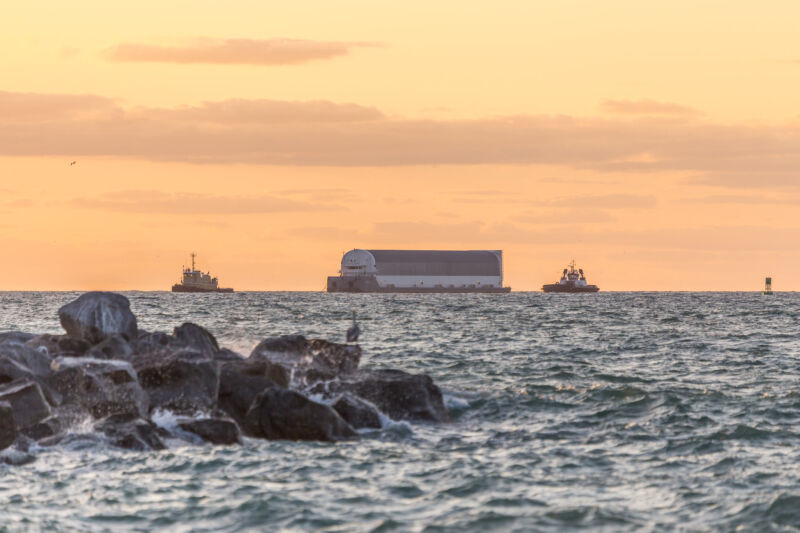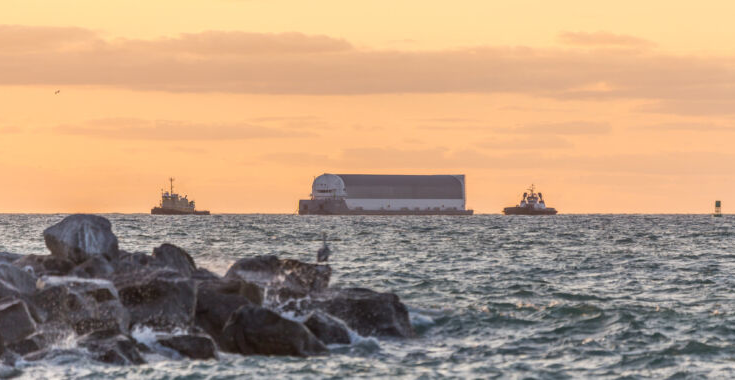
United Launch Alliance
Welcome to Edition 4.39 of the Rocket Report! As usual there is plenty to discuss in the world of launch this week, from a successful hot fire test in Spain to a not-so-successful fueling test at Kennedy Space Center in Florida. So without further delay, read away.
As always, we welcome reader submissions, and if you don’t want to miss an issue, please subscribe using the box below (the form will not appear on AMP-enabled versions of the site). Each report will include information on small-, medium-, and heavy-lift rockets as well as a quick look ahead at the next three launches on the calendar.

Pythom Space tests Eiger rocket, receives blowback. On March 19, the California-based small launch company conducted a hold-down test of the first stage of its Eiger rocket with a single engine. (The complete first stage will have nine small engines.) The company uploaded a video containing this footage about three weeks ago. Lasting about 2 minutes and 40 seconds, the video shows instances where Pythom employees appear to be handling the Eiger rocket and its hypergolic propellants with less than industry-standard care. At one point in the company’s promotional video, a handful of employees can be seen running from an expanding cloud of dust and exhaust.
Responding to the blowback … The video went largely unnoticed until a source passed it along to Ars, and we reported on it. The video prompted hundreds of replies, including some from rather horrified rocket scientists. In response to this report, Pythom Space pushed back with an update that listed other accidents by other launch companies. Then it added, “Our message to the aerospace community is simply this. Should we only allow billionaires and formal aerospace engineers to lead our way into space? Or should we encourage all space enthusiasts cheering on the sidelines that they too can actually start building themselves, step by step, even if they are not part of traditional space?” Be sure to check out the photo credit.
PLD Space completes static fire test. On Wednesday the Spanish launch company announced on Twitter that it had successfully completed the first static fire test of its Miura 1 launch vehicle. Raúl Torres, the chief executive of the company, added that PLD Space was “almost ready” for its first test flight of the suborbital launch vehicle. It will occur from the airport of Teruel in eastern Spain, possibly during the second half of this year.
From one to five … The Miura 1 rocket is essentially a technology demonstrator for the company, which was founded a decade ago. PLD Space intends to take what it has learned from Miura 1 and develop the Miura 5 rocket, which would be capable of putting as much as 300 kg into a Sun-synchronous orbit. The company is among a handful of launch startups in Europe trying to kick-start a new space industry on the continent.
Consortium wins bid to build Indian rockets. As part of India’s efforts to develop a commercial space agency, the country’s space agency, ISRO, in 2020 offered private companies the chance to independently build the Polar Satellite Launch Vehicle. Now, BusinessToday.In reports, Hindustan Aeronautics Limited and L&T consortium has emerged as the lowest bidder to make five Polar Space Launch Vehicles for ISRO by the middle of this decade.
Satellite bus up next … The first privately built rocket is expected to be completed sometime during the second half of 2024, with the remaining four rockets to be delivered in 2025 and 2026. This is the first time in the ISRO’s history that an entire rocket, including the heat shield, is to be made outside of the space agency. As a next step toward leveraging India’s emerging private space industry, ISRO is exploring the possibility of having the industry build the India Mini Satellite-1 Bus.
Astra sells electric thrusters. Astra Space said Tuesday it reached an agreement to sell electric thrusters by LeoStella, part of the company’s efforts to move beyond launch, Space News reports. Astra said it sold “multiple” Astra Spacecraft Engines to LeoStella, the Seattle-based smallsat manufacturer. The companies did not disclose the value of the agreement or even the number of thrusters ordered, but Astra said those thrusters will be delivered starting later this year and continuing into 2023.
Moving around in space … Tod Byquist, director of programs and supply chain at LeoStella, said in a statement that his company was looking for “innovative options” for providing propulsion for the satellites it manufactures. “Astra’s Spacecraft Engine has good flight heritage and the performance we need to get our satellites to space on schedule,” he said. Astra obtained the engine technology from Apollo Fusion, an electric propulsion startup that Astra acquired in 2021. The thruster can use krypton or xenon propellants, producing between 18 and 25 millinewtons of thrust with an input power of 400 watts. (submitted by Ken the Bin)
Maine creates a space corporation. The Maine Senate enacted a proposal to create the Maine Space Corporation on Monday. Supporters of the idea said they envision the corporation as a central hub for innovation and economic development in the state’s air and space industry, AP reports. Members of the aerospace industry have taken an interest in Maine in recent years, in part because it is home to the former Loring Airforce Base and Brunswick Landing.
Shifting to Maine … The state’s geography and existing infrastructure make it a candidate to serve as a site for small launches, industry officials told the legislature. The proposal must still be signed by Democratic Gov. Janet Mills. The bill is likely to benefit BluShift Aerospace, which is based in Maine. Previously the small launch company had said it would have to explore opportunities to launch from Kennedy Space Center after residents of Jonesport, Maine, voted overwhelmingly to impose a moratorium on any aerospace activities in the town. (submitted by MR)



